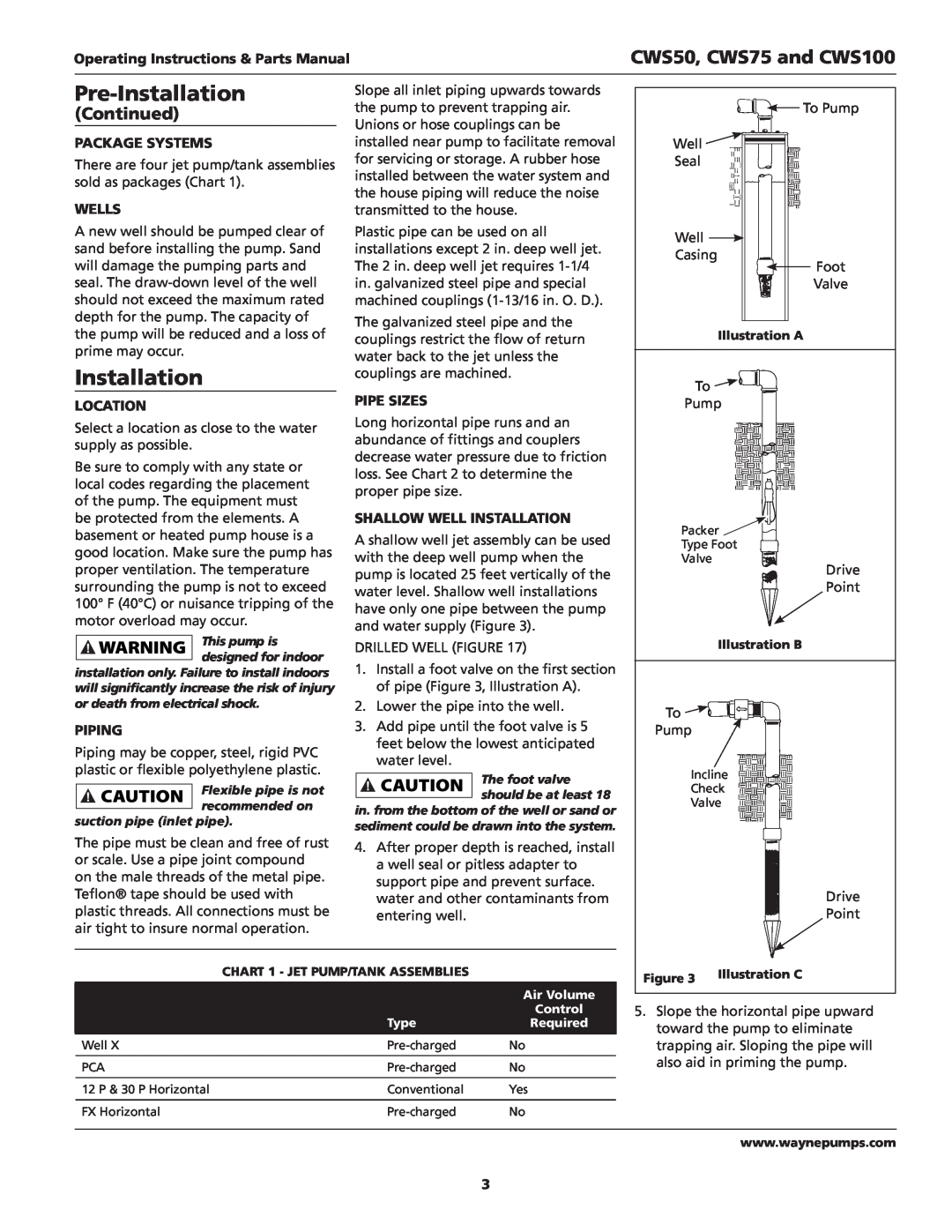
Operating Instructions & Parts Manual | CWS50, CWS75 and CWS100 |
(Continued)
PACKAGE SYSTEMS
There are four jet pump/tank assemblies sold as packages (Chart 1).
WELLS
A new well should be pumped clear of sand before installing the pump. Sand will damage the pumping parts and seal. The
Installation
LOCATION
Select a location as close to the water supply as possible.
Be sure to comply with any state or local codes regarding the placement of the pump. The equipment must be protected from the elements. A basement or heated pump house is a good location. Make sure the pump has proper ventilation. The temperature surrounding the pump is not to exceed 100° F (40°C) or nuisance tripping of the motor overload may occur.
This pump is designed for indoor
installation only. Failure to install indoors will significantly increase the risk of injury or death from electrical shock.
PIPING
Piping may be copper, steel, rigid PVC plastic or flexible polyethylene plastic.
Flexible pipe is not recommended on
suction pipe (inlet pipe).
Slope all inlet piping upwards towards the pump to prevent trapping air. Unions or hose couplings can be installed near pump to facilitate removal for servicing or storage. A rubber hose installed between the water system and the house piping will reduce the noise transmitted to the house.
Plastic pipe can be used on all installations except 2 in. deep well jet. The 2 in. deep well jet requires
The galvanized steel pipe and the couplings restrict the flow of return water back to the jet unless the couplings are machined.
PIPE SIZES
Long horizontal pipe runs and an abundance of fittings and couplers decrease water pressure due to friction loss. See Chart 2 to determine the proper pipe size.
SHALLOW WELL INSTALLATION
A shallow well jet assembly can be used with the deep well pump when the pump is located 25 feet vertically of the water level. Shallow well installations have only one pipe between the pump and water supply (Figure 3).
DRILLED WELL (FIGURE 17)
1.Install a foot valve on the first section of pipe (Figure 3, Illustration A).
2.Lower the pipe into the well.
3.Add pipe until the foot valve is 5 feet below the lowest anticipated water level.
The foot valve should be at least 18
in. from the bottom of the well or sand or sediment could be drawn into the system.
![]()
![]()
![]() To Pump
To Pump
Well ![]()
Seal
Well ![]()
Casing
![]()
![]() Foot
Foot
Valve
Illustration A
To ![]()
![]()
![]()
![]()
![]()
Pump
Packer ![]()
![]()
Type Foot
Valve
Drive
Point
Illustration B
To ![]()
![]()
![]()
![]()
![]()
![]()
![]()
![]()
Pump
Incline
Check
Valve
The pipe must be clean and free of rust | 4. After proper depth is reached, install | |||
or scale. Use a pipe joint compound | ||||
a well seal or pitless adapter to | ||||
on the male threads of the metal pipe. | ||||
support pipe and prevent surface. | ||||
Teflon® tape should be used with | ||||
water and other contaminants from | ||||
plastic threads. All connections must be | ||||
entering well. |
| |||
air tight to insure normal operation. |
| |||
|
|
| ||
|
| |||
CHART 1 - JET PUMP/TANK ASSEMBLIES |
| |||
|
|
|
| |
|
|
| Air Volume | |
|
|
| Control | |
|
| Type | Required | |
Well X |
| No | ||
|
|
|
| |
PCA |
| No | ||
|
|
|
| |
12 P & 30 P Horizontal |
| Conventional | Yes | |
|
|
|
| |
FX Horizontal |
| No | ||
Drive
Point
Figure 3 | Illustration C |
|
5.Slope the horizontal pipe upward toward the pump to eliminate trapping air. Sloping the pipe will also aid in priming the pump.
www.waynepumps.com
3
